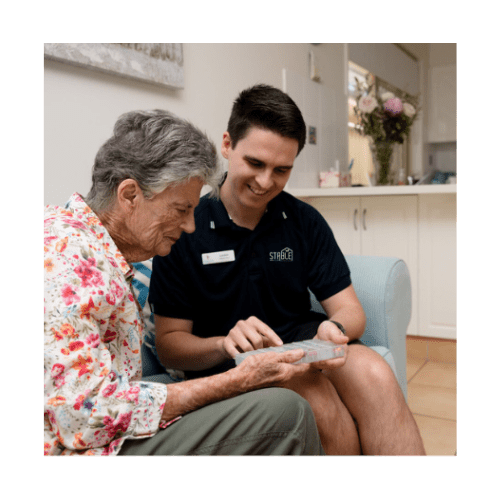Choosing the Right Home Care Providers: NDIS Plan Manager Insights and In Home Caregivers
Wiki Article
Just How In Home Care Givers Address the One-of-a-kind Difficulties and Psychological Requirements of Households Seeking Assistance for Their Loved Ones
At home caretakers play a critical role in navigating the complexities dealt with by family members looking for support for their liked ones. By comprehending special household characteristics and providing customized psychological support, these specialists not only address prompt care requirements yet also promote an atmosphere of depend on and open communication. This technique is important in managing the emotional pressure often experienced by families, as it recognizes their concerns and verifies their experiences. However, the nuances of this connection prolong past mere caregiving; the effects for household health and caregiving efficacy warrant additionally expedition.Understanding Household Characteristics
Recognizing family dynamics is essential for giving effective at home treatment, as each family operates within a special set of communications and relationships. These characteristics encompass different aspects, consisting of communication styles, roles, and class structure that influence exactly how care is supplied and received. The caretaker needs to recognize these elements to make sure that care strategies straighten with the household's expectations and values.Various family members may exhibit distinctive patterns of interaction, such as hierarchical frameworks or joint approaches. As an example, in some families, a primary decision-maker may hold considerable influence, while in others, choices might be a lot more democratic. Comprehending these patterns assists caregivers customize their strategies to fit the household's details demands.
In addition, cultural backgrounds play an essential function in forming household characteristics. Caretakers need to be culturally experienced, acknowledging and valuing varied practices and beliefs that might impact care preferences.
Inevitably, a comprehensive understanding of family dynamics assists in enhanced communication, promotes count on, and improves the caretaker's capability to support the household effectively. By acknowledging the detailed internet of partnerships and duties, caregivers can create a supportive setting that promotes well-being for both the individual obtaining treatment and the family overall.
Providing Emotional Support
Offering emotional support is an important component of in-home care that significantly boosts the wellness of both the individual getting care and their household members. In the context of caregiving, emotional support entails active listening, empathy, and validation of sensations. Caregivers are trained to acknowledge the psychological battles that households deal with, such as isolation, anxiousness, and sense of guilt, and to give a compassionate visibility that reduces these concerns.By promoting open interaction, caregivers produce a secure space for member of the family to express their worries and concerns. This dialogue not just motivates emotional launch but also strengthens count on between the household and the caregiver. Additionally, caretakers can use sensible strategies to help families handle anxiety and advertise strength.

Eventually, the psychological assistance provided by in-home caregivers boosts the lifestyle for both customers and their households, advertising an extra compassionate and understanding caregiving atmosphere. This all natural method makes certain that psychological needs are addressed together with physical health and wellness factors to consider.
Managing Daily Treatment Tasks
Handling daily care tasks is a crucial facet of at home treatment that makes certain individuals obtain the assistance they require to preserve their wellness and self-reliance. Caregivers play a vital role in aiding with tasks of everyday living (ADLs), that include bathing, dressing, brushing, and meal preparation. By handling these responsibilities, caregivers assist reduce the physical and psychological worries that families may encounter while caring for their liked ones.
Along with personal treatment, caregivers are additionally charged with medicine administration, ensuring that clients follow suggested dosages and routines. This oversight is vital for preserving wellness and stopping negative results from missed out on or wrong medicines. Furthermore, caregivers often aid with movement, supplying assistance for customers moving their homes, thereby decreasing the threat of drops and boosting total security.

Fostering Open Communication
Efficient monitoring of everyday care tasks usually rests on the high quality of interaction in between caretakers, read customers, and their households. Open interaction fosters an environment where worries, preferences, and responses can be freely exchanged, making sure that treatment is customized to fulfill private requirements. Caregivers need to prioritize normal check-ins with both clients and their families, assisting in discussions that deal with any issues or changes in care demands.Making use of numerous communication techniques-- such as in person conferences, phone calls, and written updates-- can enhance understanding and supply family members with peace of mind. It's important for caretakers to actively listen, showing empathy and respect for the psychological landscape of the household. Urging questions from relative can additionally help clear up care strategies and strengthen the caretaker's dedication to openness.
Moreover, keeping open lines of interaction allows caregivers to identify and respond quickly to any type of shifts in a client's health and wellness status or emotional health. This aggressive technique not just reinforces the caregiver-client vibrant but also equips households to participate actively in the treatment procedure. Ultimately, fostering open communication is important for boosting the high quality of at home care and advertising an encouraging environment for all included.
Structure Count On and Relationships
Trust is the cornerstone of successful in-home treatment, as it develops a structure for significant connections in between caretakers, clients, and their households. Structure this trust fund needs consistent, clear communication and an authentic dedication to the well-being of those involved. Caretakers must show dependability through preparation, adherence to care plans, and responsiveness to the requirements and preferences of clients.To promote depend on, caretakers need to engage in energetic listening, making sure that families feel heard and comprehended. This entails not just resolving instant problems however likewise anticipating future demands, thus empowering households and boosting their feeling of control. Creating rapport with shared experiences and respectful interactions can even more strengthen these relationships.
Furthermore, caregivers have to be trained to identify and resolve the psychological complexities encountered by families. By showing empathy and compassion, they can ease uncertainties and worries, reinforcing count on. Regular updates and check-ins with family members can also boost openness, allowing them to really feel engaged and informed concerning their loved one's care.
Eventually, developing depend on and nurturing connections in at home treatment site is a collective procedure that significantly influences the high quality of care given, promoting an encouraging setting that benefits everybody entailed.
Conclusion
In-home caretakers play an essential duty in dealing with the distinct difficulties and emotional demands of families. By recognizing family members characteristics, providing psychological assistance, and cultivating open interaction, caretakers improve the total caregiving experience. Their capacity to manage day-to-day care tasks while constructing Read Full Article count on and solid partnerships grows an encouraging atmosphere for clients and their family members. Ultimately, the thoughtful engagement of caregivers considerably adds to enhanced health and strength for those browsing the complexities of caregiving.Recognizing household characteristics is essential for providing efficient at home care, as each family runs within an one-of-a-kind set of partnerships and communications.Providing emotional support is an essential part of at home treatment that considerably boosts the wellness of both the specific receiving treatment and their household members. By taking on these duties, caregivers help minimize the physical and emotional concerns that family members might deal with while caring for their loved ones.
Effective administration of day-to-day care tasks typically pivots on the top quality of communication between caretakers, customers, and their families - in home caregivers.Count on is the foundation of successful in-home care, as it establishes a structure for significant connections between caretakers, clients, and their family members
Report this wiki page